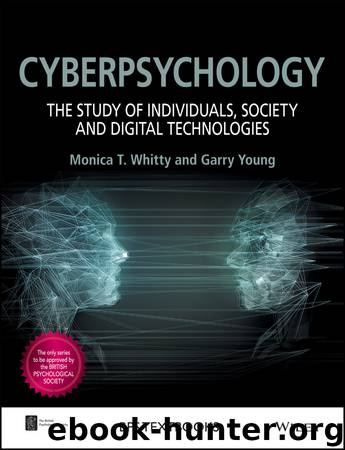Cyberpsychology by Whitty Monica T.; Young Garry; & Garry Young

Author:Whitty, Monica T.; Young, Garry; & Garry Young
Language: eng
Format: epub
Publisher: John Wiley & Sons, Incorporated
Published: 2016-12-27T00:00:00+00:00
SUGGESTED ACTIVITY
Consider the available video games that include taboo activities. Do you think any of these ought to be banned? Why do you think this?
10.6 GAMES FOR LEARNING
Much of what we have examined in this chapter has focused on the negative effects of playing online computer games; however, there are many positive reasons why someone might play these games. The obvious reason is that these games, for some, are an enjoyable leisure activity. Researchers have also found a number of positive effects associated with playing video games. Ferguson (2007), for example, found that playing violent video games was associated with improved visuospatial abilities. Given these results, accompanied by those of other studies, researchers started to reason that online computer games might actually develop useful skills (Subrahmanyam & Greenfield, 1994) and be used for educational and training purposes (Connolly, Boyle, MacArthur, Hainey & Boyle, 2012). Games that are specifically designed to improve or develop new skills are referred to as ‘serious games’, although computer games that have been developed just for entertainment purposes can also teach people new skills. Serious games have been formally defined as ‘mental contest[s], played with a computer in accordance with specific rules, that [use] entertainment to further government or corporate training, education, health, public policy, and strategic communication objectives (Zyda, 2005, p. 26).
Models have been developed to categorize the types of skills individuals might learn from playing video games. Skills can include content understanding, collaboration and/or teamwork, problem‐solving, communication and self‐regulation, changing attitudes, improving knowledge, cognitive skills, motor skills, affective learning outcomes and communicative learning outcomes (O’Neil, Wainess & Baker, 2005; Wouters, Van der Spek & Van Oostendorp, 2009). In addition, video games can be designed with the intention to change motivations and affect – for example, towards exercise. Games have been designed to motivate people to learn subjects such as maths (Wijer, Jonker & Kerstens, 2008) and history (Huizenga, Admirall, Akkerman and ten Dam, 2008), although research has found that not all games achieve their objectives (Huizenga et al., 2008). Games have also been developed to assist individuals with intellectual and physical disabilities. Serious games, for example, have demonstrated great potential for people who are blind to develop work‐based skills and to explore new spaces and reduce their reliance on guides (Evett, Battersby, Ridley & Brown, 2009; Brown et al., 2011).
Various workplaces and organizations have also developed games to teach and train staff. Various military organizations, for example, have developed serious games to train their officers and soldiers in skills such as strategies and tactics as well as cultural awareness, interpersonal communication, adaptability and rapport‐building skills (Smith, 2010). It is common for government and corporations to train their staff. The game It’s A Deal! was created for such purposes, to teach intercultural business communication between Spaniards and Britons in business settings (Guillen‐Nieto & Aleson‐Carbonell, 2012).
There is still much more research needed to determine how effective computer games are at imparting certain skills; however, the early research findings suggest some promise. Moreover, further research is needed
Download
This site does not store any files on its server. We only index and link to content provided by other sites. Please contact the content providers to delete copyright contents if any and email us, we'll remove relevant links or contents immediately.
Hello! Python by Anthony Briggs(9938)
The Mikado Method by Ola Ellnestam Daniel Brolund(9805)
Dependency Injection in .NET by Mark Seemann(9364)
Sass and Compass in Action by Wynn Netherland Nathan Weizenbaum Chris Eppstein Brandon Mathis(7805)
The Well-Grounded Java Developer by Benjamin J. Evans Martijn Verburg(7583)
Svelte with Test-Driven Development by Daniel Irvine(7370)
Test-Driven Development with PHP 8 by Rainier Sarabia(7113)
Layered Design for Ruby on Rails Applications by Dementyev Vladimir;(6969)
Secrets of the JavaScript Ninja by John Resig & Bear Bibeault(6550)
Secrets of the JavaScript Ninja by John Resig Bear Bibeault(6440)
Web Development with Django by Ben Shaw Saurabh Badhwar(6436)
React Application Architecture for Production by Alan Alickovic(6155)
Jquery UI in Action : Master the concepts Of Jquery UI: A Step By Step Approach by ANMOL GOYAL(5827)
Kotlin in Action by Dmitry Jemerov(5087)
Audition by Ryu Murakami(4604)
Software Architecture for Web Developers by Mihaela Roxana Ghidersa(4562)
Accelerating Server-Side Development with Fastify by Manuel Spigolon Maksim Sinik & Matteo Collina(4415)
Hands-On Full-Stack Web Development with GraphQL and React by Sebastian Grebe(4333)
Solidity Programming Essentials by Ritesh Modi(4120)
